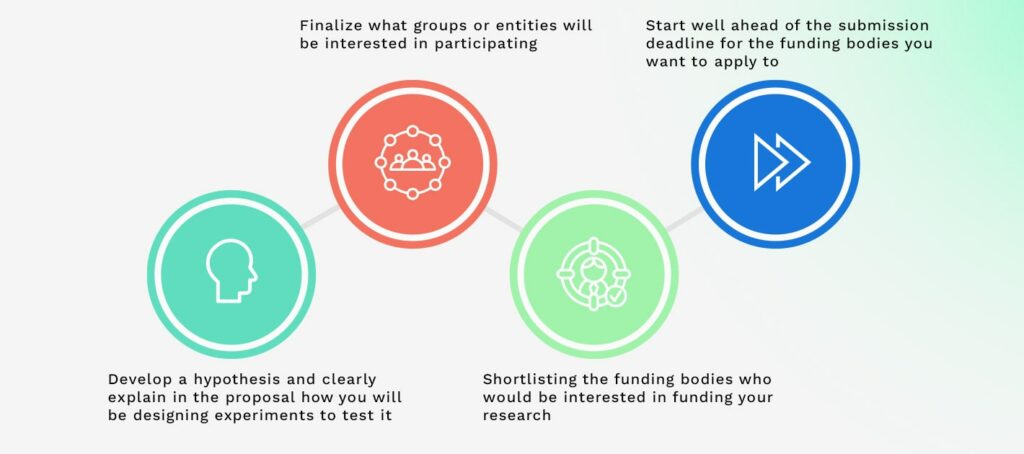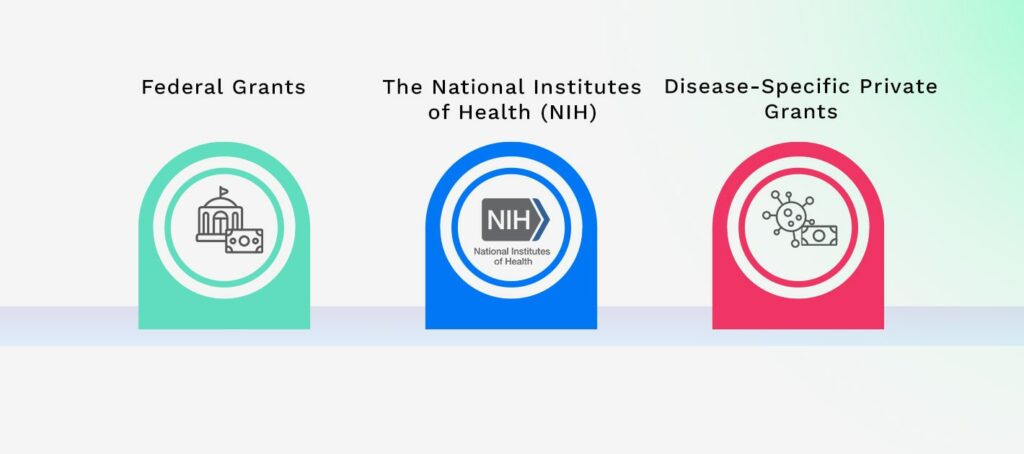Ask any clinical research funding coordinator about the most challenging part of their work, and they will undoubtedly say, "securing funds for the project."
Research requires money, and finding the funds you need to carry out your project is essential and time-consuming. While there are many funding bodies to pitch to, you have to realize that they go through hundreds, if not thousands, of research proposals. In this article, we'll talk about effective ways you can obtain funding to fuel your clinical research.
We'll buid your first application for you. At no extra cost.
Let us build your first business application for free. Go from an idea to an application in under 2 weeks.

What is Clinical Research Funding?
Clinical research funding refers to the financial support allocated for the investigation, testing, and development of new medical treatments, drugs, and technologies. This funding is essential for conducting trials that assess the safety, efficacy, and effectiveness of these potential medical breakthroughs. It can come from a variety of sources, including government grants, private-sector investments, and philanthropy.
Why is Clinical Research Funding Important?
Funding enables researchers to convert promising theories into tangible health solutions, offering hope for treatments or even cures for diseases. Without adequate funding, many innovative ideas would remain unexplored, stalling potential advances in medical care.
Steps to Take Before Applying for Funding
To ensure successful awards of funds, you need to:
- Develop a hypothesis and clearly explain in the proposal how you will be designing experiments to test it;
- Finalize what groups or entities will be interested in participating;
- Shortlisting the funding bodies who would be interested in funding your research;
- Start well ahead of the submission deadline for the funding bodies you want to apply to.

Important Fundraising Tips for Clinical Research
Here are some critical steps to enhance your fundraising efforts:
- Create a user-friendly, secure online page for donations to make it easy for donors to contribute.
- Segment donors based on their interests and past contributions, offering a personalized touch.
- Set up options for donors to make regular contributions, providing a steady stream of funding.
- Launch campaigns for specific research needs, allowing the wider community to contribute.
- Share positive impact stories to inspire and motivate potential donors.
- Maintain open lines of communication with updates on research progress and acknowledgments of contributions.
- Organize events to raise funds and awareness within your community.
- Encourage satisfied donors to spread the word, expanding your network of supporters.
- Build partnerships with businesses interested in your research area for mutual benefits.
- Take advantage of media outlets to raise awareness and attract donations.
- Leverage the power of traditional fundraising methods like mail campaigns and in-person requests.
- Actively seek and incorporate feedback to refine and improve your fundraising strategies.
Sources of Funding
There are many websites and organizations dedicated to funding clinical research. However, most of them require a hefty subscription or membership fee to get access.
Paying these organizations might seem convenient to get funding, but you'll be surprised to know many free resources can help you get access to the capital you need, including research grants, awards, fellowships, cooperatives, and more.
Here's a list of different types of funds available to clinical researchers:
Federal Grants
Grants.gov records all fellowships, grants, and other funding possibilities across all 26 agencies of the U.S. government. This includes the Department of Health and Human Services, the Environmental Protection Agency, the National Science Foundation, and the Department of Energy. The website has an extensive search feature that allows you to search for funding based on keywords, funding type, category, agency, and more.
The National Institutes of Health (NIH)
The National Institute of Health is the most comprehensive public funder of biomedical research in the world. They have over 24 institutes and centers awarding $32 billion a year in grants to enhance human life and overcome disease and disability. The website offers extensive information on the different types of funding available through their organization, and what kind of research and studies are eligible for their funding.
The site also offers a dedicated page for researchers with information and tips on applying for grants. They also have a section for research with animals, which provides special requirements for creating a grant.
Disease-Specific Private Grants
There are many organizations and funding bodies that offer grants based on projects studying specific, rare, diseases. They include:
Cancer
As cancer is one of the most common diseases affecting the US and Canada, it has the most funding budgets available. Following is a list of all organizations that fund cancer clinical research:
- Alex's Lemonade Stand Foundation: This organization funds childhood cancer research projects with a focus on improving treatments and finding cures.
- American Association for Cancer Research: A leading organization that supports cancer research through grants, fellowships, and advocacy efforts.
- American Cancer Society: One of the largest funders of cancer research globally, supporting a wide range of projects aimed at preventing, detecting, and treating cancer.
- Children's Leukemia Research Association: Provides funding for research focused on leukemia and related diseases in children to improve outcomes and quality of life.
- Conquer Cancer Foundation: Supports innovative cancer research initiatives and programs to improve patient care and outcomes.
- Leukemia & Lymphoma Society: Funds research to advance the understanding and treatment of blood cancers, including leukemia, lymphoma, and myeloma.
- Lustgarten Foundation for Pancreatic Cancer Research: Dedicated to funding research aimed at improving early detection, treatment, and outcomes for pancreatic cancer patients.
- Mary Kay Foundation: Provides grants for research on cancers affecting women, including breast, uterine, cervical, and ovarian cancers.
- Melanoma Research Foundation: Supports research focused on preventing, diagnosing, and treating melanoma, a type of skin cancer.
- Multiple Myeloma Research Foundation: Funds research to accelerate the development of new treatments and improve outcomes for multiple myeloma patients.
- National Cancer Institute: The federal government's principal agency for cancer research, funding a wide range of studies to advance understanding and treatment of cancer.
- Susan G. Komen: Focuses on funding research to prevent and cure breast cancer, as well as supporting programs for breast cancer patients and survivors.
Other Diseases
Many other organizations offer funding for ailments like Alzheimer's, heart, lung, brain, and other increasingly common diseases. They include:
- Alzheimer's Association: A leading nonprofit organization dedicated to funding research on Alzheimer's disease, providing support services for patients and caregivers, and advocating for policies to advance Alzheimer's research and care.
- American Thyroid Foundation: Supports research aimed at understanding and treating thyroid disorders, including thyroid cancer, hypothyroidism, and hyperthyroidism.
- American Brain Tumor Association: Funds research to improve the understanding, diagnosis, and treatment of brain tumors, as well as providing support services for patients and families affected by brain cancer.
- American Federation for Aging Research: Supports research on aging-related diseases and conditions, with a focus on improving the health and quality of life of older adults.
- American Heart Association: A major nonprofit organization funding research on heart disease and stroke, as well as promoting cardiovascular health through education, advocacy, and community programs.
- American Lung Association: Funds research on lung diseases such as asthma, chronic obstructive pulmonary disease (COPD), and lung cancer, while also advocating for clean air and lung health education.
- American Society of Hematology: Supports research and education in the field of hematology, focusing on blood disorders such as leukemia, lymphoma, and sickle cell disease.
- Arthritis National Research Foundation: Funds research on arthritis and related autoimmune diseases to develop new treatments and improve outcomes for arthritis patients.
- Cure Alzheimer's Fund: A nonprofit organization dedicated to funding research aimed at preventing, slowing, or reversing Alzheimer's disease through innovative approaches and collaborations.
- Cystic Fibrosis Foundation: Supports research on cystic fibrosis (CF), a genetic disorder that affects the lungs and digestive system to find a cure and improve the quality of life for CF patients.
- Muscular Dystrophy Association: Funds research on muscular dystrophy and related neuromuscular diseases, providing support services and resources for individuals and families affected by these conditions.

Conclusion
Securing adequate funding is crucial for the success of clinical research endeavors. Exploring various funding options and leveraging the power of online database software enables research organizations to streamline their research management processes, enhance collaboration, and ultimately make breakthrough discoveries.
Don't let the complexities of managing research data hold you back. Embrace the power of online database software, like Kohezion. Contact us today
Frequently Asked Questions
Securing funding for clinical research is difficult because many researchers are competing for limited funds. Agencies get more grant applications than they can support, so the chance of getting funding is low. Several factors affect the chances, including how important the research is, how well it's planned, and the researchers' track record. Also, funding priorities and budgets change, making it even harder to get funding. That’s why it is important to plan your grant application carefully and show how your research is unique and valuable.
Yes, individuals can donate to clinical research projects. Donations from individuals can make a significant difference in advancing medical research and helping scientists pursue important discoveries.
Companies often collaborate with academic institutions, research organizations, and healthcare providers to support research initiatives. These partnerships can involve financial contributions, in-kind donations, or sponsorship of specific research projects. Corporate entities may also provide access to resources, expertise, and technology that can enhance the research process. Partnering with corporations gives researchers access to additional funding opportunities and resources, which can speed up discovery and innovation in healthcare.
Feedback is essential for improving fundraising efforts in clinical research. Soliciting feedback from donors, funding organizations, and stakeholders gives research teams valuable insights into the effectiveness of their fundraising strategies. This feedback helps identify areas for improvement, such as communication methods, donor engagement tactics, and fundraising event planning. Also, feedback can highlight donors' preferences and priorities, allowing research organizations to tailor their fundraising campaigns to better meet donor expectations. Incorporating feedback into fundraising efforts fosters transparency, trust, and accountability, ultimately enhancing the likelihood of securing funding for critical research projects.

